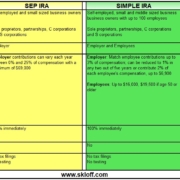How Gifting Versus Selling Your Home Can Be a Tax Dream or a Tax Nightmare – Part 2

Money Matters – Skloff Financial Group Question of the Month – July 1, 2024
By Aaron Skloff, AIF, CFA, MBA
Q: We read ‘How a Gift Can Be a Tax Dream or a Tax Nightmare’ Part 1 and Part 2. We also read ‘How To (Legally) Avoid Taxes When Selling Your Home’ Part 1, Part 2 and Part 3. Lastly, we read ‘How Gifting Versus Selling Your Home Can Be a Tax Dream or a Tax Nightmare’ Part 1. We are considering gifting our home to our child and their spouse. What are the tax benefits and detriments of gifting versus selling our home?
The Problem – How Selling Versus Gifting Your Home Can Be a Tax Dream or a Tax Nightmare
Many people sell their home to their child and child’s spouse without realizing the tax benefits the seller and buyer gain. The amount and timing of the sale and create a tax dream or a tax nightmare.
The Solution – Understanding the Tax Benefits of Selling Versus Gifting Your Home
Selling your home can generate tax benefits for you and the person who is purchasing your home versus the future tax liabilities created through gifting.
Are You Interested in Learning More?
Selling Your Home Can Generate Tax Benefits to You, Your Child and Their Spouse or All Parties – A Tax Dream
If you and your spouse sell your home for $600,000 (with a $100,000 costs basis or Adjusted Basis) to your child and their spouse, neither you nor they have to pay any taxes. The price at which you sell your home becomes their new cost basis.
When it comes to estate, financial, retirement and tax planning, the devil is in the details. As examined in the articles referenced above, assets have a cost basis and may be subject to income taxes or capital gains taxes and Net Investment Income Tax (NIIT or investment surtax) upon sale. How can one tax dream become two tax dreams?
When you sell your home, based on certain criteria, your gains are exempt from taxes. Using the example above, if you and your spouse sell your home for $600,000 (your primary residence with a $100,000 cost basis or Adjusted Basis) and meet the Eligibility Test, your gain is exempt from taxes – a tax dream. If your child and your child’s spouse then sell that home (their primary residence) and meet the Eligibility Test, their gains may be exempt from taxes – a tax dream. Two tax dreams are always better than one tax dream.
Your Child and Child’s Spouse Sell the Home Within a Year at a Gain. If your child and their spouse sell that home without making any capital improvements (such as a bathroom or kitchen renovation), for $1,100,000 in 1 year or less, based on their 35% marginal income tax bracket, they would be subject to income taxes of $175,000 ($1,100,000 selling price – $600,000 cost basis = $500,00 gain X 35%) plus NIIT of $19,000 ($500,000 gain X 3.8%). Total taxes of $194,000 would leave them with $906,000 of proceeds net of taxes – a tax dream.
Your Child and Child’s Spouse Sell the Home More Than 1 Year but Less Than 2 Years Later at a Gain. If your child and their spouse sell that home without making any capital improvements for $1,100,000 more than 1 year but less than 2 years later, based on their income, they would be subject to long term capital gains taxes of $100,000 ($1,100,000 selling price – $600,000 cost basis = $500,00 gain X 20%) plus NIIT of $19,000 ($500,000 gain X 3.8%). Total taxes of $119,000 would leave them with $981,000 of proceeds net of taxes – a tax dream.
Your Child and Child’s Spouse Sell the Home 2 Years Later at a Gain. If your child and their spouse sell that home without making any capital improvements for $1,100,000 after 2 years or more, based on meeting the Eligibility Test, their gain is exempt from taxes ($1,100,000 selling price – $600,000 cost basis = $500,00 gain – $500,000 capital gain exclusion = $0). Since your total taxes are $0, you are left with $1,100,000 of proceeds net of taxes – a tax dream.
Conclusion
By selling your home to your child and child’s spouse for $600,000 (with a $100,000 costs basis) and meeting the Eligibility Test, you avoid taxes on a $500,000 gain – a tax dream. If they then sell that home for $1,100,000 (with a $600,000 cost basis) and meet the Eligibility Test, they avoid taxes on a $500,000 gain – a tax dream. That’s a total of $1,000,000 of tax-free gains. Two tax dreams are always better than one tax dream.
Action Steps
Work closely with your Registered Investment Adviser (RIA) to reduce your taxes, and grow and preserve your wealth.
Aaron Skloff, Accredited Investment Fiduciary (AIF), Chartered Financial Analyst (CFA), Master of Business Administration (MBA) is CEO of Skloff Financial Group, a Registered Investment Advisory firm specializing in financial planning, investment management and benefits for small to middle sized companies. He can be contacted at www.skloff.com or 908-464-3060.












